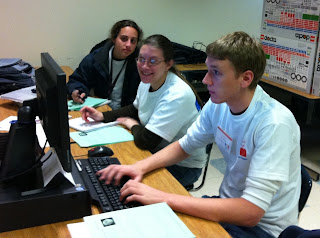On Saturday November 6, 2010, the Math Club sponsored a trip to the fall meeting of the EPaDel (Eastern Pennsylvania and Delaware) section of the MAA (Mathematical Association of America) held at LaSalle University in Philadelphia. This fall's meeting was a special joint meeting with the New Jersey section of the MAA. There were invited talks given by Dr. William Dunham of Muhlenberg College ("Two (More) Morsels from Euler"), Dr. Brian Hopkins of St. Peter’s College ("Partition Dynamics ABCs: Avalanche Models, Bulgarian Solitaire, and Combinatorial Proofs"), and Dr. Sarah Greenwald of Appalachian State University ("Rubik's Cube Games on Spheres: Geometry of Spherical Orbifolds"), plus there were a number of talks given by undergraduate and graduate students from across the region.
Two of our own gave talks. Debra Bruch spoke on "The Harmony between Math and Music". She showcased how mathematics plays a central role in many principles of sound and music. Brett Eyer's talk, titled "The Dependencies of Euclid", revealed the relations between various propositions in Book 1 of the Elements of Euclid, culminating in a demonstration of those used to establish the Pythagorean Theorem. (Note: Brett is scheduled to give an encore presentation of his talk at the next Math Club meeting following the Thanksgiving break.)
Altogether, six students from Penn State Harrisburg, Debra Bruch, Tyler Derr, Brett Eyer, Khizra Hussain, Gege Pincin, and Micah Victoria, attended and enjoyed the variety of talks, not to mention several other tangential experiences. (Please feel free to ask any who attended about the dynamics of Bulgarian solitaire, the work of Bourbaki, or the perplexities of higher dimensional spheres.) Both Debra Bruch and Micah Victoria won special books as door prizes.
The EPaDel section of MAA holds both fall and spring meetings. The Math Club is making plans to sponsor a trip to the Spring 2011 meeting, which is planned to be held at the Harrisburg Area Community College, which is nearby. If you have interest in attending the spring meeting please contact either Brett Eyer or Khizra Hussain.
--
Ronald A. Walker
Assistant Professor
Dept. of Computer Science and Mathematical Sciences
Penn State Harrisburg
777 West Harrisburg Pike
Middletown, PA 17057 USA
Phone: (717)948-6673
Email: rawalker (at) psu (dot) edu
Two of our own gave talks. Debra Bruch spoke on "The Harmony between Math and Music". She showcased how mathematics plays a central role in many principles of sound and music. Brett Eyer's talk, titled "The Dependencies of Euclid", revealed the relations between various propositions in Book 1 of the Elements of Euclid, culminating in a demonstration of those used to establish the Pythagorean Theorem. (Note: Brett is scheduled to give an encore presentation of his talk at the next Math Club meeting following the Thanksgiving break.)
Altogether, six students from Penn State Harrisburg, Debra Bruch, Tyler Derr, Brett Eyer, Khizra Hussain, Gege Pincin, and Micah Victoria, attended and enjoyed the variety of talks, not to mention several other tangential experiences. (Please feel free to ask any who attended about the dynamics of Bulgarian solitaire, the work of Bourbaki, or the perplexities of higher dimensional spheres.) Both Debra Bruch and Micah Victoria won special books as door prizes.
The EPaDel section of MAA holds both fall and spring meetings. The Math Club is making plans to sponsor a trip to the Spring 2011 meeting, which is planned to be held at the Harrisburg Area Community College, which is nearby. If you have interest in attending the spring meeting please contact either Brett Eyer or Khizra Hussain.
--
Ronald A. Walker
Assistant Professor
Dept. of Computer Science and Mathematical Sciences
Penn State Harrisburg
777 West Harrisburg Pike
Middletown, PA 17057 USA
Phone: (717)948-6673
Email: rawalker (at) psu (dot) edu



